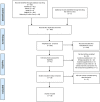Dietary guideline adherence during preconception and pregnancy: A systematic review
- PMID: 31793249
- PMCID: PMC7083492
- DOI: 10.1111/mcn.12916
Dietary guideline adherence during preconception and pregnancy: A systematic review
Abstract
The aim of this study is to determine the level of adherence to dietary guidelines among men and women during preconception, and pregnant women, and factors associated with adherence. Searches were conducted in CINAHL, AMED, EMBASE, and Maternity and Infant Care from inception to March 2018. Observational studies assessing the primary outcome (adherence to dietary guidelines and/or nutritional recommendations) and/or secondary outcome (factors associated with adherence) were eligible. Study quality was assessed using the National Institutes of Health Quality Assessment Tool for Observational Cohort and Cross-sectional studies. Men or women (aged ≥18 years) who identified as trying/intending to conceive or were pregnant. Eighteen studies were included. The quality of studies was fair (44%) to good (56%). Most studies indicated preconceptual and pregnant women do not meet recommendations for vegetable, cereal grain, or folate intake. Pregnant women did not meet iron or calcium intake requirements in 91% and 55% of included studies, respectively, and also exceeded fat intake recommendations in 55% of included studies. Higher level education was associated with improved guideline adherence in pregnant women, whereas older age and non-smoking status were associated with greater guideline adherence in preconceptual and pregnant women. The findings of this review suggest that preconceptual and pregnant women may not be meeting the minimum requirements stipulated in dietary guidelines and/or nutritional recommendations. This could have potential adverse consequences for pregnancy and birth outcomes and the health of the offspring. Major knowledge gaps identified in this review, which warrant further investigation, are the dietary intakes of men during preconception, and the predictors of guideline adherence.
Keywords: diet; dietary intake assessment; dietary recommendations; preconception nutrition; pregnancy and nutrition; systematic review.
© 2019 The Authors. Maternal & Child Nutrition published by John Wiley & Sons, Ltd.
Conflict of interest statement
The authors declare that they have no conflicts of interest.
Similar articles
-
Factors associated with adherence to nutritional recommendations before and during pregnancy.Women Health. 2018 Nov-Dec;58(10):1094-1111. doi: 10.1080/03630242.2017.1388332. Epub 2018 Jan 2. Women Health. 2018. PMID: 29120272
-
No. 367-2019 Canadian Guideline for Physical Activity throughout Pregnancy.J Obstet Gynaecol Can. 2018 Nov;40(11):1528-1537. doi: 10.1016/j.jogc.2018.07.001. Epub 2018 Oct 5. J Obstet Gynaecol Can. 2018. PMID: 30297272
-
Poor adherence to folic acid and iodine supplement recommendations in preconception and pregnancy: a cross-sectional analysis.Aust N Z J Public Health. 2016 Oct;40(5):424-429. doi: 10.1111/1753-6405.12552. Epub 2016 Aug 14. Aust N Z J Public Health. 2016. PMID: 27523027
-
Paternal preconception modifiable risk factors for adverse pregnancy and offspring outcomes: a review of contemporary evidence from observational studies.BMC Public Health. 2023 Mar 16;23(1):509. doi: 10.1186/s12889-023-15335-1. BMC Public Health. 2023. PMID: 36927694 Free PMC article.
-
Guidelines for the management of pregnant women with obesity: A systematic review.Obes Rev. 2020 Mar;21(3):e12972. doi: 10.1111/obr.12972. Epub 2020 Jan 14. Obes Rev. 2020. PMID: 31943650 Free PMC article.
Cited by
-
Dietary patterns and associations with biomarkers of inflammation in adults: a systematic review of observational studies.Nutr J. 2021 Mar 12;20(1):24. doi: 10.1186/s12937-021-00674-9. Nutr J. 2021. PMID: 33712009 Free PMC article.
-
Impact of Diet Quality during Pregnancy on Gestational Weight Gain and Selected Adipokines-Results of a German Cross-Sectional Study.Nutrients. 2022 Apr 5;14(7):1515. doi: 10.3390/nu14071515. Nutrients. 2022. PMID: 35406128 Free PMC article.
-
Maternal diet quality and nutrient intakes across preconception and pregnancy are not consistent with Australian guidelines: Results from the pilot BABY1000 study.Food Sci Nutr. 2023 May 4;11(7):4113-4123. doi: 10.1002/fsn3.3401. eCollection 2023 Jul. Food Sci Nutr. 2023. PMID: 37457169 Free PMC article.
-
Medical and Psychological Aspects of Pregnancy in Women with Obesity and after Bariatric Surgery.Nutrients. 2023 Oct 8;15(19):4289. doi: 10.3390/nu15194289. Nutrients. 2023. PMID: 37836575 Free PMC article. Review.
-
The Intake of Omega-3 Fatty Acids, the Omega-3 Index in Pregnant Women, and Their Correlations with Gestational Length and Newborn Birth Weight.Nutrients. 2024 Jul 5;16(13):2150. doi: 10.3390/nu16132150. Nutrients. 2024. PMID: 38999896 Free PMC article.
References
-
- Best, K. P. , Gold, M. , Kennedy, D. , Martin, J. , & Makrides, M. (2016). Omega‐3 long‐chain PUFA intake during pregnancy and allergic disease outcomes in the offspring: A systematic review and meta‐analysis of observational studies and randomized controlled trials. American Journal of Clinical Nutrition, 103(1), 128–143. 10.3945/ajcn.115.111104 - DOI - PubMed
-
- Bojar, I. , Wdowiak, L. , Humeniuk, E. , & Blaziak, P. (2006). Change in the quality of diet during pregnancy in comparison with WHO and EU recommendations—Environmental and sociodemographic conditions. Annals of Agricultural and Environmental Medicine, 13(2), 281–286. Retrieved from. https://www.ncbi.nlm.nih.gov/pubmed/?term=Change+in+the+quality+of+diet+... - PubMed
Publication types
MeSH terms
LinkOut - more resources
Full Text Sources
Medical


